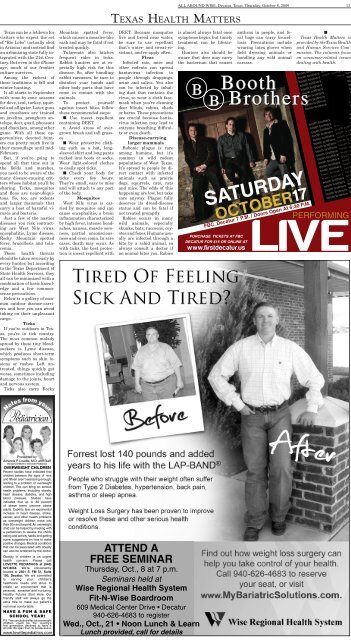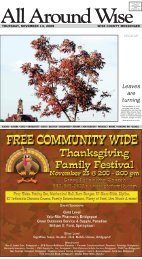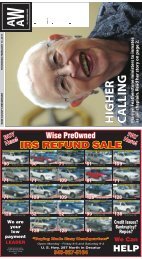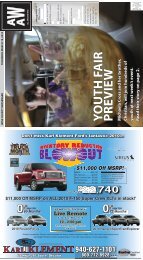decatur - Wise County Messenger
decatur - Wise County Messenger
decatur - Wise County Messenger
Create successful ePaper yourself
Turn your PDF publications into a flip-book with our unique Google optimized e-Paper software.
TEXAS HEALTH MATTERS<br />
ALL AROUND WISE, Decatur, Texas, Thursday, October 8, 2009 13<br />
Texas can be a letdown for<br />
visitors who expect the set<br />
of “Rio Lobo” (actually shot<br />
in Arizona) and instead find<br />
an urbanizing state fully integrated<br />
with the 21st Century.<br />
But even in the iPhone<br />
age, much of our frontier<br />
culture survives.<br />
Among the richest of<br />
these traditions is fall and<br />
winter hunting.<br />
It all starts in September<br />
with zone-by-zone seasons<br />
for dove, teal, turkey, squirrel<br />
and alligator. Later, guns<br />
and crossbows are trained<br />
on javelina, pronghorn antelope,<br />
deer, quail, pheasant<br />
and chacalaca, among other<br />
game. With all these opportunities,<br />
devoted hunters<br />
can pretty much live in<br />
their camouflage until mid-<br />
February.<br />
But, if you’re going to<br />
spend all that time out in<br />
the fields and marshes,<br />
you need to be aware of the<br />
many disease-causing critters<br />
whose habitat you’ll be<br />
sharing. Ticks, mosquitos<br />
and fleas are near-ubiquitous.<br />
So, too, are rodents<br />
and larger mammals that<br />
carry a host of harmful viruses<br />
and bacteria.<br />
Just a few of the nastier<br />
diseases you risk contracting<br />
are West Nile virus,<br />
encephalitis, Lyme disease,<br />
Rocky Mountain spotted<br />
fever, brucellosis and tularemia.<br />
These health threats<br />
should be taken seriously by<br />
every hunter, but according<br />
to the Texas Department of<br />
State Health Services, they<br />
all can be minimized with a<br />
combination of basic knowledge<br />
and a few commonsense<br />
precautions.<br />
Below is a gallery of common<br />
outdoor disease-carriers<br />
and how you can avoid<br />
taking on their unpleasant<br />
cargo.<br />
Ticks<br />
If you’re outdoors in Texas,<br />
you’re in tick country.<br />
The most common malady<br />
spread by these tiny bloodsuckers<br />
is Lyme disease,<br />
which produces short-term<br />
symptoms such as skin lesions<br />
or rashes. Left untreated,<br />
things quickly get<br />
worse, sometimes including<br />
damage to the joints, heart<br />
and nervous system.<br />
Ticks also carry Rocky<br />
Mountain spotted fever,<br />
which causes a measles-like<br />
rash and may be fatal if not<br />
treated quickly.<br />
Tularemia also hitches<br />
frequent rides in ticks.<br />
Rabbit hunters are at especially<br />
high risk for this<br />
disease. So, after handling<br />
rabbit carcasses, be sure to<br />
disinfect your hands and<br />
other body parts that have<br />
come in contact with the<br />
animals.<br />
To protect yourself<br />
against insect bites, follow<br />
these recommended steps:<br />
! Use insect repellent<br />
containing DEET.<br />
n Avoid areas of overgrown<br />
brush and tall grasses.<br />
! Wear protective clothing<br />
such as a hat, longsleeved<br />
shirt and long pants<br />
tucked into boots or socks.<br />
Wear light-colored clothes<br />
to easily spot ticks.<br />
! Check your body for<br />
ticks every few hours.<br />
They’re small, easy to miss<br />
and will attach to any part<br />
of the body.<br />
Mosquitos<br />
West Nile virus is carried<br />
by mosquitos and can<br />
cause encephalitis, a brain<br />
inflammation characterized<br />
by high fever, intense headaches,<br />
nausea, muscle soreness,<br />
partial unconsciousness<br />
and even coma. In rare<br />
cases, death may occur. As<br />
with ticks, the best protection<br />
is insect repellent with<br />
DEET. Because mosquitos<br />
live and breed near water,<br />
be sure to use repellant<br />
that’s water- and sweat-resistant,<br />
and re-apply often.<br />
Fleas<br />
Infected rats, mice and<br />
other rodents can spread<br />
hantavirus infection to<br />
people through droppings,<br />
urine and saliva. You also<br />
can be infected by inhaling<br />
dust that contains the<br />
virus, so wear a cloth facemask<br />
when you’re cleaning<br />
deer blinds, cabins, sheds<br />
or barns. These precautions<br />
are crucial because hantavirus<br />
infection may lead to<br />
extreme breathing difficulty<br />
or even death.<br />
Disease-carrying<br />
larger mammals<br />
Bubonic plague is rare<br />
among humans, but it’s<br />
common in wild rodent<br />
populations of West Texas.<br />
It’s spread to people by direct<br />
contact with infected<br />
animals such as prairie<br />
dogs, squirrels, cats, rats<br />
and mice. The odds of this<br />
happening are low, but take<br />
care anyway. Plague fully<br />
deserves its dread-disease<br />
status and can be fatal if<br />
not treated promptly.<br />
Rabies occurs in many<br />
wild animals, especially<br />
skunks, bats, raccoons, coyotes<br />
and foxes. Humans usually<br />
are infected through a<br />
bite by a rabid animal, so<br />
always consult a doctor if<br />
an animal bites you. Rabies<br />
is almost always fatal once<br />
symptoms begin, but timely<br />
treatment can be lifesaving.<br />
Hunters also should be<br />
aware that deer may carry<br />
the bacterium that causes<br />
anthrax in people, and feral<br />
hogs can carry brucellosis.<br />
Precautions include<br />
wearing latex gloves when<br />
field dressing animals or<br />
handling any wild animal<br />
carcass.<br />
B Booth<br />
B Brothers<br />
s<br />
SATURDAY<br />
17<br />
FBC. Decatur 7 P.M. / Doors Open At 6:30 P.M.<br />
!<br />
Texas Health Matters is<br />
provided by the Texas Health<br />
and Human Services Commission.<br />
The columns focus<br />
on consumer-related issues<br />
dealing with health.<br />
PERFORMING<br />
Presented by<br />
Amanda P. Lovette, M.D. and Staff<br />
Board Certified in General Pediatrics<br />
OVERWEIGHT CHILDREN<br />
Recent studies have indicated that<br />
children between the ages of nine<br />
and fifteen aren’t exercising enough,<br />
leading to a problem of overweight<br />
children. This can bring on serious<br />
health problems, including obesity,<br />
heart disease, diabetes, and high<br />
blood pressure. Studies have<br />
indicated that up to 80 percent<br />
of obese teens become obese<br />
adults. Experts fear an exponential<br />
increase in heart disease, stroke,<br />
cancer, and other health problems<br />
as overweight children move into<br />
their 20s and beyond. An overweight<br />
child can be helped by meeting with<br />
a pediatrician to assess the child’s<br />
eating and activity habits and getting<br />
some suggestions on how to make<br />
positive changes. Medical conditions<br />
that can be associated with obesity<br />
can also be screened by the doctor.<br />
Obesity in children is an urgent<br />
health concern. Please call<br />
LOVETTE PEDIATRICS at (940)<br />
627-8044. We’re conveniently<br />
located at 2401 S. FM 51, Suite<br />
100, Decatur. We are committed<br />
to serving your children’s<br />
healthcare needs and strive to<br />
create an environment that is<br />
personal, sensitive and nurturing.<br />
Healthy Futures Start Here. Our<br />
friendly staff will always go the<br />
extra mile to make our patient’s<br />
visit most comfortable.<br />
HAVE A FUN & SAFE<br />
SCHOOL YEAR!<br />
P.S. The cumulative effect of overweight<br />
children could be the country’s<br />
fi rst generation destined to have a<br />
shorter life span than its predecessor.<br />
www.lovettepediatrics.com<br />
ATTEND A<br />
FREE SEMINAR<br />
Thursday, Oct., 8 at 7 p.m.<br />
Seminars held at<br />
<strong>Wise</strong> Regional Health System<br />
Fit-N-<strong>Wise</strong> Boardroom<br />
609 Medical Center Drive • Decatur<br />
940-626-4683 to register<br />
Wed., Oct., 21 • Noon Lunch & Learn<br />
Lunch provided, call for details

















